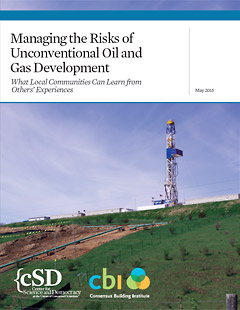Unconventional oil and gas production methods such as fracking (hydraulic fracturing) have expanded rapidly in recent decades, accelerating production both from areas historically rich in oil and gas and from completely new regions.
This expansion has created challenges for local governments as they respond to overtures from oil and gas developers. Because the growth of fracking has outpaced full scientific understanding of its impacts, local officials must respond in a context of uncertainty about the facts and fragmented public opinion.
And because local authority to regulate fracking is subject to legal limits that vary from state to state, municipal and county officials need to make use of all the tools at their disposal—regulatory, non-regulatory, and fiscal. Our 2015 report, Managing the Risks of Unconventional Oil and Gas Development, based on interviews with local public officials, highlights regulatory, non-regulatory, and fiscal tools local officials and decision makers can use to manage the impacts and risks associated with oil and gas development.




